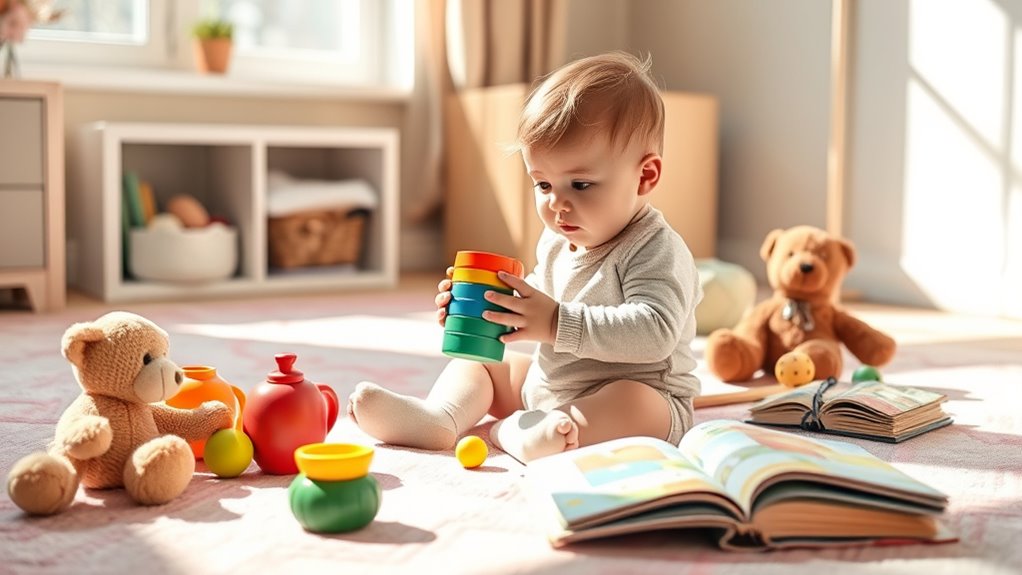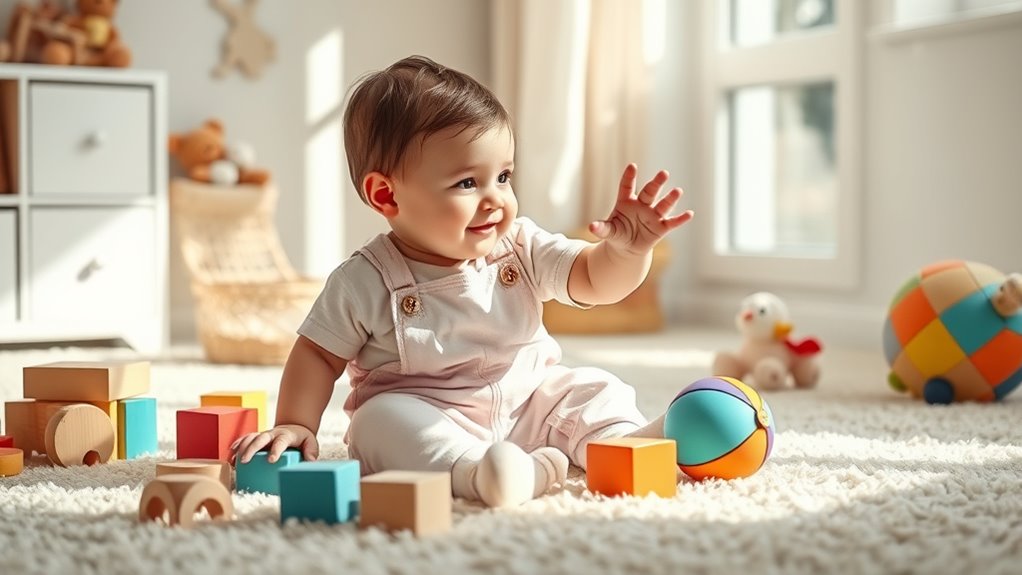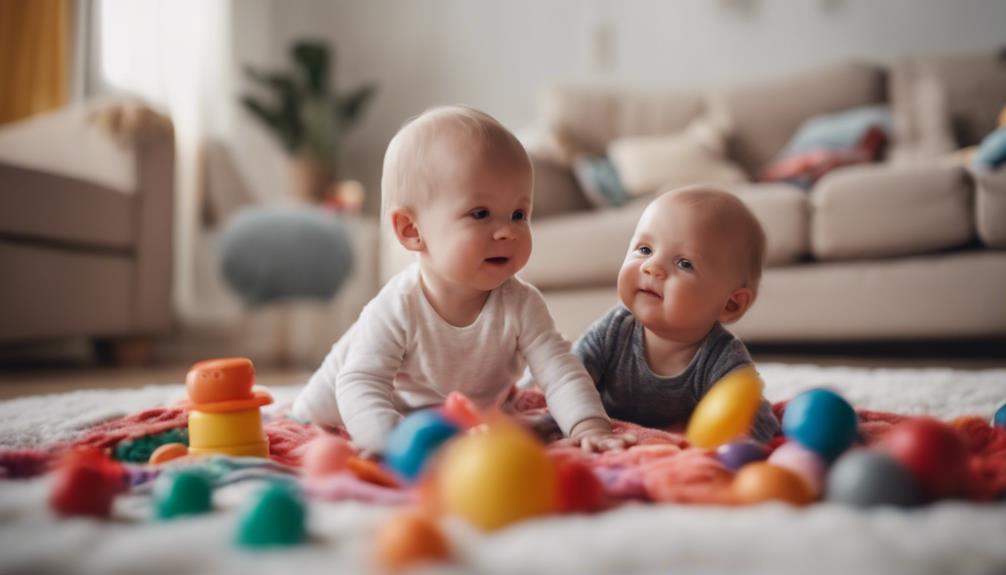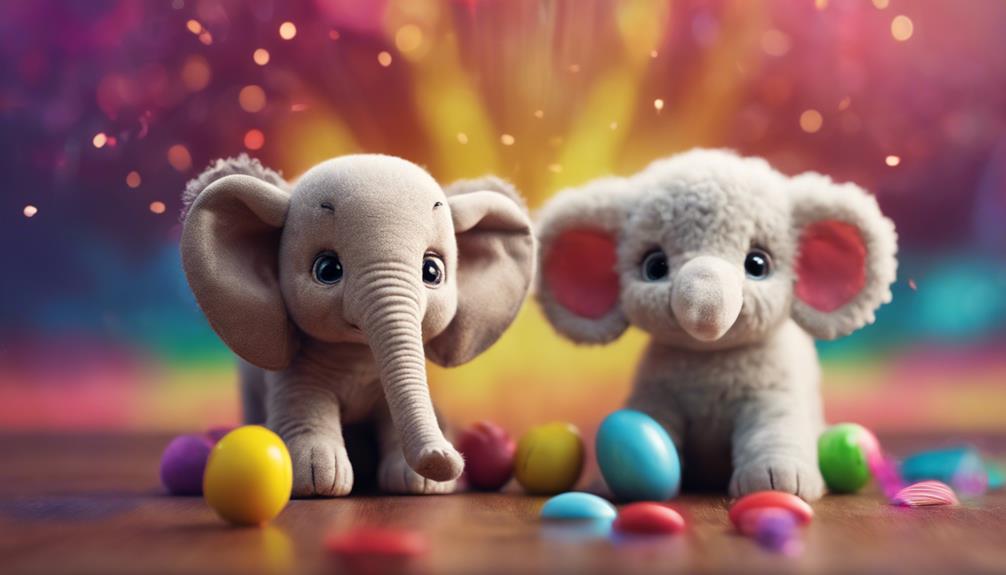To encourage your baby to play independently, create a safe, inviting space filled with age-appropriate toys like stacking blocks, textured objects, and soft books. Start with short play sessions and gradually increase these as your baby becomes more comfortable. Stay nearby to offer reassurance without interrupting their exploration, and praise their efforts to build confidence. Keep the environment engaging and rotate toys regularly. If you keep these tips in mind, you’ll discover more ways to foster independent play.
Key Takeaways
- Create a safe, inviting environment with age-appropriate toys and soft surfaces to promote curiosity and secure exploration.
- Start with short independent play sessions, gradually increasing duration as your baby gains confidence.
- Stay nearby, offering reassurance through your presence without interrupting their exploration and self-entertainment.
- Rotate toys regularly to maintain interest and stimulate different senses and skills.
- Use positive reinforcement and celebrate their efforts to build confidence and encourage ongoing independent play.

Looking for engaging ways to enjoy your own company? Encouraging your baby to play independently can be both rewarding and beneficial. One of the main advantages of solo play is that it helps your little one develop essential skills like concentration, problem-solving, and self-confidence. When your baby spends time playing alone, they learn to entertain themselves, which fosters a sense of independence and resilience. Plus, solo play offers you moments of quiet and reflection, giving you a break to recharge or focus on other tasks.
Creating safe play spaces is the foundation for successful independent play. When you set up an area that’s free of hazards and filled with age-appropriate toys, your baby feels secure and curious to explore. Use soft mats, cushioned corners, and secure furniture to prevent accidents. Keep small objects or choking hazards out of reach, and ensure the space is well-supervised. By establishing a designated and safe environment, you’re reassuring your baby that they can explore freely without constant supervision, which encourages longer periods of independent play.
Creating a safe, hazard-free space encourages your baby to explore and play independently.
To make the space inviting, include a variety of toys that stimulate different senses and skills. Think about stacking blocks, soft books, musical toys, or textured objects. Rotate these toys regularly to keep your baby interested and engaged. Remember that safe play environments aren’t just about physical safety—it’s also about making the environment engaging enough that your baby will want to spend time there. When they find the space inviting and full of interesting items, they’ll be more inclined to play on their own.
Start by introducing short periods of independent play, gradually increasing the time as your baby becomes more comfortable. Stay nearby to offer reassurance without interrupting their exploration. You can sit at a distance or in the same room, so they learn that you’re present but not hovering. Over time, your baby will start to enjoy solo play, gaining confidence and skills along the way. Consistency is key: the more regularly you encourage independent play in a safe space, the more natural it will become for your little one. Remember, patience and positive reinforcement go a long way. Celebrate their efforts, and avoid rushing to intervene unless necessary, so they develop a sense of independence and trust in their own abilities.
Frequently Asked Questions
How Can I Tell if My Baby Is Ready for Independent Play?
You can tell if your baby is ready for independent play by observing their developmental milestones, like sitting up unassisted or reaching for toys. When your baby shows curiosity and can focus on objects for a few minutes, they’re likely ready. Create a safe, engaging play environment with age-appropriate toys, and watch for signs of comfort and interest. Gradually introduce solo play, building their confidence and independence over time.
What Safety Precautions Should I Take During Solo Play?
To guarantee safe solo play, you should follow a baby proofing checklist and create safe play areas. Check for hazards like sharp objects, choking risks, and electrical outlets. Keep toys age-appropriate and avoid small parts. Supervise your baby initially, then gradually let them explore independently within designated safe zones. Regularly inspect your environment and stay attentive to your baby’s actions to prevent accidents during solo play.
How Long Should My Baby Play Alone at Each Age?
At each age, your baby’s play duration varies. For infants, start with 5-10 minutes using age-appropriate toys, gradually increasing as they grow. Around 12 months, aim for 15-20 minutes, and by age two, they can handle 30 minutes of independent play. Pay attention to your child’s cues and guarantee the environment is safe. This helps foster independence while keeping them engaged and secure.
How Do I Handle My Baby’S Separation Anxiety During Solo Play?
When your baby shows separation anxiety during solo play, start with trust-building activities like short, comforting goodbyes and consistent routines. Use comfort strategies such as a favorite blanket or toy to help them feel secure. Gradually increase alone time, always reassuring them with your presence nearby. Patience is key; over time, these steps will help your little one feel safe and confident playing independently.
Can Solo Play Help Develop My Baby’S Social Skills?
Solo play can markedly boost your baby’s social skill development by encouraging independence building. When your little one plays alone, they learn to entertain themselves, which fosters confidence and self-reliance. As they explore and interact with toys or objects, they start understanding social cues and emotional regulation. This independence during solo play creates a strong foundation for future social interactions, helping your baby become more comfortable engaging with others.
Conclusion
Encouraging your baby to play independently isn’t just about fostering skills; it’s about planting seeds of confidence that bloom over time. Imagine a garden where each independent moment is a vibrant flower, brightening your child’s world and yours. With patience and gentle guidance, you’ll watch them flourish, discovering joy in their own little adventures. Remember, every small step they take alone is a leap toward a confident, curious future—so let their independence blossom.










